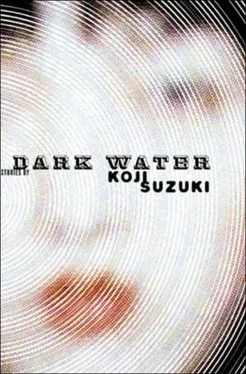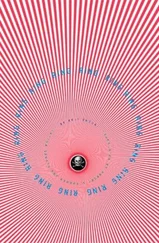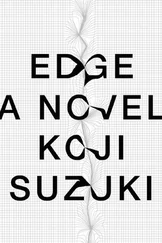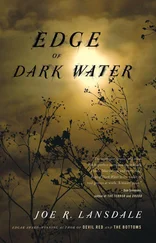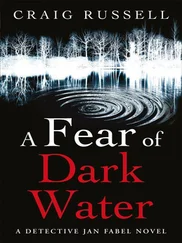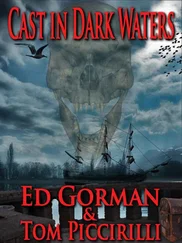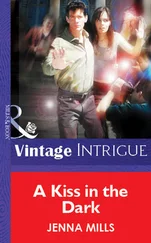Koji Suzuki - Dark Water
Здесь есть возможность читать онлайн «Koji Suzuki - Dark Water» — ознакомительный отрывок электронной книги совершенно бесплатно, а после прочтения отрывка купить полную версию. В некоторых случаях можно слушать аудио, скачать через торрент в формате fb2 и присутствует краткое содержание. Год выпуска: 2006, ISBN: 2006, Издательство: Vertical, Жанр: Ужасы и Мистика, на английском языке. Описание произведения, (предисловие) а так же отзывы посетителей доступны на портале библиотеки ЛибКат.
- Название:Dark Water
- Автор:
- Издательство:Vertical
- Жанр:
- Год:2006
- ISBN:9781932234220
- Рейтинг книги:3 / 5. Голосов: 1
-
Избранное:Добавить в избранное
- Отзывы:
-
Ваша оценка:
- 60
- 1
- 2
- 3
- 4
- 5
Dark Water: краткое содержание, описание и аннотация
Предлагаем к чтению аннотацию, описание, краткое содержание или предисловие (зависит от того, что написал сам автор книги «Dark Water»). Если вы не нашли необходимую информацию о книге — напишите в комментариях, мы постараемся отыскать её.
, which spawned the hit film and sequels. The first story in this collection has been adapted to film (
, Walter Salles), and another, “
” is currently in production with Dimension Films.
Naoki Prize Nominee (1996) Izumi Kyoka Prize Nominee (1996)
Dark Water — читать онлайн ознакомительный отрывок
Ниже представлен текст книги, разбитый по страницам. Система сохранения места последней прочитанной страницы, позволяет с удобством читать онлайн бесплатно книгу «Dark Water», без необходимости каждый раз заново искать на чём Вы остановились. Поставьте закладку, и сможете в любой момент перейти на страницу, на которой закончили чтение.
Интервал:
Закладка:
Dark Water
by
Koji Suzuki
PROLOGUE
Whenever her son and his family came down from Tokyo to spend time with her, Kayo would take her little granddaughter Yuko out on early morning walks. They always made their way to Cape Kannon, the easternmost tip of the Miura Peninsula. It was just the right distance for a stroll, the walk around the cape and back to the house measuring less than two miles.
On the spacious observation platform provided for a panoramic view from the cape, Yuko would point far out to sea at whatever had aroused her curiosity, excitedly tug on her grandmother’s hand, and buffet her with a flurry of questions. Kayo answered each of them patiently. Yuko had arrived the day before — she was on summer vacation — and was to stay for another week. The prospect of spending time with her granddaughter was, for Kayo, simply exhilarating.
The view of the furthermost recesses of Tokyo Bay beyond the Tokyo-Yokohama industrial area remained hazy. You rarely got a clear view all the way across, for Tokyo Bay was larger than people thought. In contrast, the mountains of the Boso Peninsula seemed to rise up immediately across the Uraga Waterway, and a high and distinct ridge snaked from Mt Nokogiri to Mt Kano.
Yuko let go of the railing and stretched her arms out as if trying to grasp something. Cape Futtsu, whose long, slender sandbar lay on the opposite side of the bay, appeared to be almost within reach.
The imaginary line that connected Cape Futtsu and Cape Kannon was the threshold of Tokyo Bay, and a stream of cargo vessels proceeded in and out in two neat columns through a corridor of water. Yuko waved to the lines of freighters, which looked like rows of toy boats from where she and her grandmother stood.
The tide flowed rapidly in the shipping lane, and striped patterns sometimes appeared on the water. High tide flooded the bay with water from the open sea, and the low tide emptied the bay. Perhaps for this reason, all the debris in Tokyo Bay was said to wash up at Cape Kannon and Cape Futtsu. If Tokyo Bay was a huge heart, the capes jutting out on each side functioned like valves filtering out waste from the seawater that circulated by the gentle pulse of the tide.
But it was not just the circulation of the sea. The rivers Edo, Ara, Sumida, and Tama all supplied fresh blood to Tokyo Bay like so many thick arteries. The variety of trash washing ashore ranged from old tires, shoes and children’s toys to the remains of wrecked fishing boats and wooden doorplates bearing addresses from as far away as Hachioji. Some of the things made you wonder how they ever ended up in the sea: bowling pins, wheelchairs, drumsticks, and lingerie…
Yuko’s attention turned to the pieces of driftage bobbing amid the waves.
Driftage can spark the beachcomer’s imagination. The sight of a motorcycle’s side cover can conjure up the image of a biker skidding off a pier into the sea, while a plastic bag stuffed with used syringes has a whiff of crime. Each item of debris has its own tale to tell. Any particularly intriguing thing you may come across on the beach is best left untouched — because it begins to tell its tale to you, as soon as you pick it up. Fine if the story is heartwarming, but if it curdles your blood, things will never be the same.
Especially if you love the sea, you ought to be mindful. You pick up what looks like a rubber glove and find out it’s really a severed hand. That sort of thing could keep you off the beaches forever. The feeling of picking up a hand is probably not too easy to shake off.
Kayo would say such things matter-of-factly to frighten her granddaughter. Every time Yuko begged for a scary story, Kayo responded by weaving a tale around a piece of driftage.
The young girl would probably ask for scary stories on every morning walk in the coming week, but Kayo had plenty of stories to tell and then some. Ever since she’d picked up that thing by the sea, one morning twenty years ago, when she’d just started taking her walks, her imagination had only been growing more active. Now, she could freely draw forth from articles of driftage the bizarre tales that littered the water’s edge.
“No treasures?” Yuko wanted to know if nicer things ever washed up, perhaps from some faraway land, instead of just the scary stuff.
All kinds of vessels, from tiny boats to giant ships, busily plied the narrow sea-lanes down there in the bay. Why shouldn’t a chest of gems plop from a ship’s cabin into the water now and then? So reasoned Yuko.
“I wouldn’t say I’ve never found any,” Kayo replied ambiguously.
“May I have it?” Though Yuko didn’t know exactly what this treasure was, her desire for it was spontaneous.
“I could give it to you,” said Kayo, hinting that the offer was conditional.
“If what?”
“If you’ll keep me company for the whole week, on my walks.”
“Of course I will!”
“Then you shall have your treasure on the morning of the day you go back to Tokyo.”
“Promise?”
To seal the bargain, they performed a pledge that was popular among children. Perhaps Yuko wouldn’t like the treasure — or even agree it was a treasure. To make sure the girl wouldn’t feel cheated, Kayo needed to keep weaving more tales, so that the setting from which the words had sprung would be vivid in Yuko’s mind.
For Kayo, one thing was certain. In the long life that Yuko had ahead of her, the moment was bound to arrive when the treasure would reveal its worth.
I — FLOATING WATER
Thinking again about drinking the tap water, Yoshimi Matsubara held the glass up to the fluorescent light in the kitchen. Rotating it just above eye level, she saw tiny bubbles floating in it. Tangled up with them, or so it seemed, were countless particles of dirt that could have come in the water or been a deposit at the bottom of the glass. She thought better of taking a second gulp and with a grimace poured the water down the sink.
It just didn’t taste the same. It was already three months since they’d moved from their rented house in Musashino to this seven-story apartment building that stood on a landfill, but she still couldn’t get used to the tap water. She’d take a gulp out of habit, but the strange odour, which wasn’t even like chloramine, attacked her nostrils and almost always kept her from finishing the glass.
“Mommy? Can we do fireworks?” It was her daughter Ikuko, now almost six years old, calling from the sofa in the living room. She hugged a bundle of miniature fireworks that a friend at nursery school had been kind enough to share with her.
Barely registering her daughter’s pleas, still clutching the empty glass, Yoshimi was picturing the path their water had to take from the Tone River. As she tried to trace the route in her mind, wondering how it differed from the flow of water back in Musashino, an image of tar-black sludge came to her. She did not know exactly when the apartment’s site had been filled, nor in what way the water pipes wound from island to island. But she did know, from a map charting the history of Tokyo Bay, that the land they lived on didn’t exist in the late ’20s. The thought that the uncertain ground beneath her feet had as its foundation the dregs of several generations enfeebled her grip on the glass.
“Mommy!”
It was dusk on a Sunday in late August. Urged on by the deepening dark, Ikuko pleaded with her mother. The water still hadn’t been turned off when Yoshimi turned to face the living room.
“There’s nowhere to set them off…”
The park by the canal in front of their building was closed for construction work, and since there was absolutely nowhere else in the neighbourhood that was suitable, Yoshimi was about to tell her daughter no. Then she realized they’d never been up to the roof of their apartment building.
Читать дальшеИнтервал:
Закладка:
Похожие книги на «Dark Water»
Представляем Вашему вниманию похожие книги на «Dark Water» списком для выбора. Мы отобрали схожую по названию и смыслу литературу в надежде предоставить читателям больше вариантов отыскать новые, интересные, ещё непрочитанные произведения.
Обсуждение, отзывы о книге «Dark Water» и просто собственные мнения читателей. Оставьте ваши комментарии, напишите, что Вы думаете о произведении, его смысле или главных героях. Укажите что конкретно понравилось, а что нет, и почему Вы так считаете.
